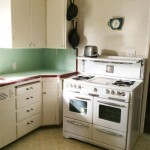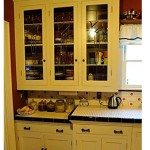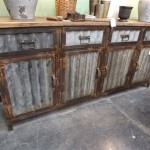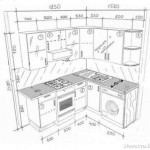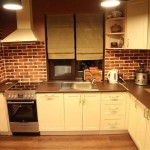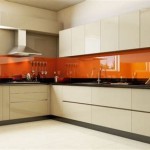Why Don't Kitchen Cabinets Go to the Ceiling?
The design of kitchen cabinets is often a point of debate, especially when it comes to whether or not they should reach the ceiling. While some homeowners swear by the practicality and aesthetic appeal of ceiling-height cabinets, others find them unnecessary and visually unappealing. Understanding the reasons behind this design choice can help you make an informed decision for your own kitchen.
Aesthetic Considerations
One primary reason for leaving space between the top of kitchen cabinets and the ceiling is aesthetic. A gap allows for visual breathing room, preventing the kitchen from feeling cramped or cluttered. This is particularly important in smaller kitchens where maximizing visual space is crucial. The gap creates a sense of openness and allows light to circulate, making the space feel more expansive.
Designers often utilize this space to introduce decorative elements, such as open shelves or a cornice molding. Open shelves can be used to display cherished items or create a focal point, while a cornice molding adds architectural detail and elevates the overall look of the kitchen. These choices personalize the space and personalize the kitchen, showcasing individual style.
Practical Concerns
While aesthetics are often considered, there are also practical considerations that influence the decision to leave a gap between the cabinets and the ceiling.
First, ceiling-height cabinets can be difficult to reach for most people, especially those of shorter stature. Retrieving items from the top shelf can be a struggle, requiring the use of a step stool or ladder. This inconvenience can deter many homeowners from utilizing the space effectively, leading to wasted storage potential.
Another practical concern is the potential for dust and grime accumulation. Ceiling-high cabinets can trap dust and debris, making cleaning more challenging and time-consuming. The space above the cabinets can become a haven for spiders and other insects, requiring regular cleaning to maintain a sanitary environment.
Exploring Alternatives
If you are interested in maximizing storage without sacrificing aesthetics, there are alternatives to ceiling-height cabinets that address both practical and design concerns.
One option is to install cabinets that reach close to the ceiling but leave a small gap for ventilation. This gap can be disguised with a decorative molding, maintaining a clean and stylish look while preventing dust accumulation. Another alternative is to utilize a combination of upper and lower cabinets, with open shelving or a decorative bulkhead in the space above. This allows for greater flexibility and personalizes the kitchen design.
Ultimately, the decision of whether or not to have kitchen cabinets that go to the ceiling is a personal one. There is no right or wrong answer, and the best choice will depend on the individual needs and preferences of the homeowner. By understanding the aesthetic and practical considerations, homeowners can make an informed decision that will create a kitchen that is both functional and beautiful.

Should Kitchen Cabinets Go All The Way Up To Ceiling Custom And Semi Remodeling In Hawthorne Point Pleasant Nj

Should Kitchen Cabinets Go All The Way Up To Ceiling Custom And Semi Remodeling In Hawthorne Point Pleasant Nj

Don T Take Your Kitchen Cabinets To The Ceiling

Kitchen Cabinets Don T Reach Ceiling

Should My Kitchen Cabinets Go To The Ceiling Cabinetdoormart Com

The Real Reason Kitchen Cabinets Don T Go Up To Ceiling

Extending Kitchen Cabinets To Ceiling American Wood Reface

Why Shaker Style Cabinet Doors Are A Timeless Choice

Closing The Space Above Kitchen Cabinets Remodelando La Casa

Space Between Ceiling And Cabinets Kitchen Remodeling Express Greensboro Nc
Related Posts

